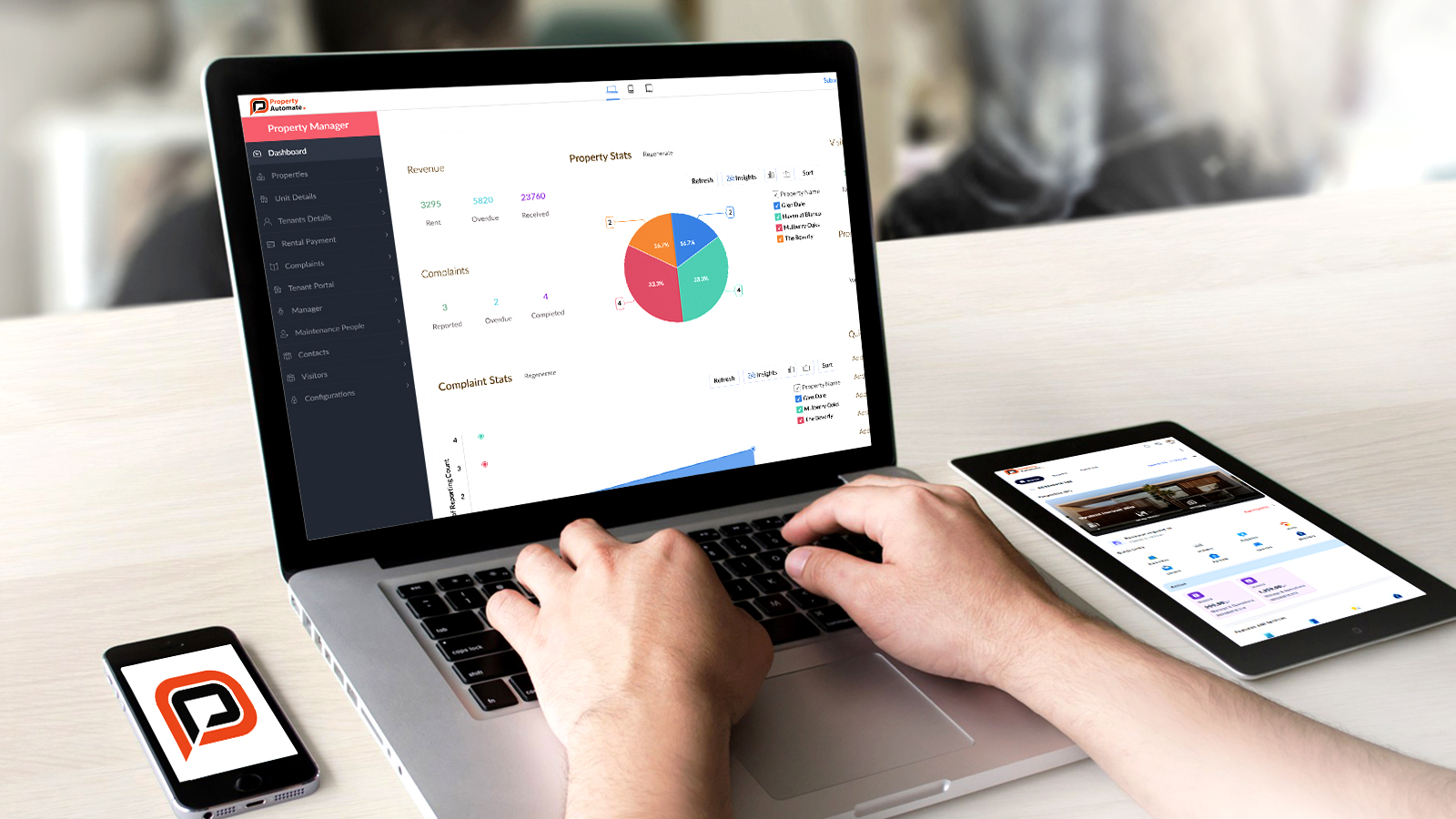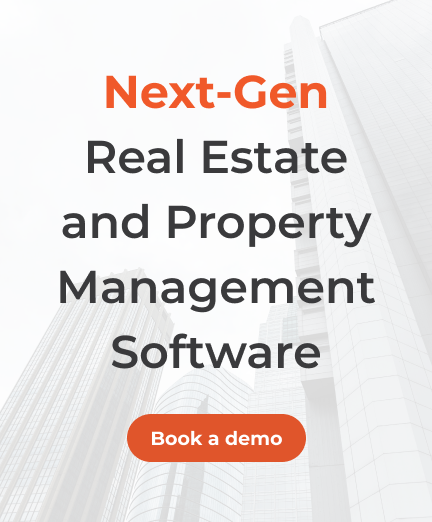Introduction
Property management software is a cloud-based platform that helps real estate businesses handle day-to-day tasks like tenant communication, lease tracking, and maintenance. Whether managing a few residential units or a large commercial portfolio, the right software improves efficiency, reduces costs, and enhances tenant experience.With a substantial investment of 24.3 billion U.S. dollars in proptech companies worldwide in 2021, the future of PMS appears promising, supported by consistent growth in investment since 2012. Let's dive into its features and emerging trends and see how it's revolutionizing property management practices.
What is Property Management Software?
At its core, property management software is a digital solution designed to revolutionize the day-to-day operations of property managers and landlords. It serves as a centralized hub for managing various aspects of property management, from rentals and lease agreements to tenant interactions, maintenance requests, financial transactions, and much more. The flexibility of PMS deployment offers two primary models: cloud-based and on-premise.
Cloud-based PMS operates on a web-based platform, allowing property managers to access and manage data remotely. This model offers flexibility, scalability, and automatic updates, reducing the burden of IT maintenance. On-premise PMS, on the other hand, is installed locally on the property manager's infrastructure. While providing control over data, this model may require more extensive IT management and lacks the flexibility and accessibility of cloud-based alternatives.
Features of Property Management Software
Effective property management software comes equipped with a range of features tailored to simplify complex tasks. This includes:
Lease and Sales Management: Simplify property sales and leasing with streamlined workflows, document handling, and enhanced search capabilities.
Visitor and Parking Management: Enhance property security through integrated access management, overseeing all security activities for smooth daily operations.
Community and Township Management: Facilitate cohesive living environments by seamlessly connecting residents with amenities, while ensuring security, maintenance, and collaboration featuresFacility and Asset Management: Streamline property maintenance activities with accessible service information and smart ticketing tools for task management and execution.
Inspection Management: Simplify maintenance tasks with easy access to service providers and efficient ticketing tools for task assignment and completion.
Financial Management: Handle all financial operations effortlessly, including receivables, payables, invoice management, and transaction facilitation.
Stay Management: Personalize short-term stays with user-friendly check-in apps and facility access, ensuring a hassle-free experience from arrival to departure.
Broker Management: Facilitate remote information management, streamline KYC processes, manage contracts, and communication, and handle payment transactions.
Services Marketplace: Access a comprehensive platform for community services, including skilled labor, maintenance, and special needs, ensuring a diverse range of service options.
Marketing and Listing: Upgrade property listing capabilities with user-friendly features and powerful search functionalities connecting owners with suitable prospects.
Do You Need a Property Management Software?
Determining the need for property management software hinges on the scale and complexity of your property management activities. If you manage single or multiple properties, deal with numerous tenants, and find yourself drowning in paperwork, investing in PMS can be a transformative game-changer. It's an investment in efficiency, accuracy, and overall business growth.
Property Automate - The Right Property Management Software for Your Business
Property Automate stands out as the premier option for property management software, providing an array of advantages for real estate businesses. With this, you experience streamlined operations, enhanced efficiency, and increased productivity. It is also available as a mobile app that works seamlessly on both iOS and Android devices. Its user-friendly interface and comprehensive features make it a perfect fit for businesses looking to simplify property management tasks.
The OpenAPI structure of Property Automate ensures seamless integration with other software systems and third-party applications, enabling property managers to customize their software stack, making it adaptable to businesses of all sizes and ensuring that it meets the unique needs of each organization.
Therefore, It is a smart investment for any real estate business seeking to optimize operations and achieve success in today's competitive market. Take the hassle out of your business. Contact our experts and schedule your free demo today!
Property management software is a transformative tool that can elevate your business operations, increase efficiency, and enhance overall tenant satisfaction. As the industry continues to evolve, staying informed about the latest trends and innovations is key to maintaining a competitive edge. Whether you manage residential, commercial, or hospitality properties, investing in the right software can propel your business toward sustained growth and success.
Key Benefits of Property Management Software
In the ever-evolving world of real estate, property management software emerges as a pivotal tool, bringing a host of benefits to streamline operations.
Efficiency Boost - It significantly improves efficiency by automating repetitive tasks such as rent collection, lease management, and maintenance requests. This automation liberates property managers to focus on strategic aspects of their business.
Accurate Financial Tracking - It provides robust financial tools, simplifying income tracking, expense management, and the generation of financial reports. This transparency offers a secure foundation for financial operations.
Enhanced Communication - Improved communication is a hallmark of PMS. It facilitates seamless communication between property managers, tenants, and maintenance personnel, leading to quicker issue resolution and tenant satisfaction.
Timesaving - Automation of routine tasks, such as document generation, lease renewals, and maintenance schedules, saves considerable time for property managers, enabling them to take a more strategic approach to their responsibilities.
Enhanced Maintenance Management - PMS solutions include features like work order tracking and preventive maintenance scheduling, ensuring properties are well-maintained and repairs are addressed promptly.
Improved Scalability - A property management system provides property managers with the flexibility to effortlessly incorporate or eliminate properties and units as their portfolio evolves or undergoes modifications, simplifying the process of scaling operations.
Accessibility - Cloud-based PMS gives property managers the freedom to access the system anytime, anywhere, facilitating real-time collaboration among team members for seamless communication and efficiency.
Data-driven Decision Making - Modern PMS includes advanced analytics, empowering property managers with insights to optimize performance and identify growth opportunities.
Data Security - It offers robust security features, safeguarding sensitive tenant and property data. Encryption, authentication, and secure cloud storage ensure information remains shielded from unauthorized access, instilling confidence in data protection.
How to Choose Property Management Software for Your Business?
Assess your needs - Identify your specific requirements and challenges. Begin your search for the right solution by understanding your requirements.
Scalability - Choose a PMS that can grow with your business. As your property portfolio expands, scalability ensures the continued effectiveness of the software.
User-friendly interface - Opt for software with an intuitive interface to ensure ease of use for you and your team, minimizing the learning curve.
Integration Capabilities - Check if the PMS can seamlessly integrate with other tools and systems you use, such as accounting software, CRM, or marketing platforms.
Customer Support - Evaluate the quality of customer support offered by the software vendor. Responsive support is crucial for troubleshooting issues and maximizing the software's potential.
Cost of Property Management Software
The cost of property management software varies based on factors like the number of units, features included, and the software provider. Some offer a subscription-based model, while others may charge a one-time licensing fee. It's essential to weigh the costs against the benefits and choose a solution that aligns with your budget and business goals.
Types of Property Management Software
Property management software comes in various types, catering to different needs and scales of operation. Common types include:
Residential PMS: Simplifies ta sks like rent collection, vendor payments, maintenance scheduling, tenant communication, tenant screening, rental applications, community management, and routine tasks, accessible through a digital interface on web or mobile devices.
Commercial PMS : Tailored for commercial property managers, it optimizes management for industrial units, office buildings, retail spaces, airports, malls and more. Features include lease admin, maintenance tracking, and financial reporting.
Community PMS : Involves overseeing shared spaces in residential communities such as townhomes and condominiums. It includes tasks like maintaining amenities, enforcing rules, and managing finances.
Vacation rental PMS : vital in the expanding vacation rental industry. It offers all-in-one solutions for managing listings, bookings, guest communication, and efficient upkeep of properties such as short-term rentals, vacation rentals, shared rooms, etc.
Integration with Other Systems
A seamless flow of information across various systems is essential for efficient property management. Integration capabilities allow property management software to connect with other tools, enhancing overall functionality. Common integrations include:
Accounting Software
Sync financial data between your property management software and accounting tools for accurate bookkeeping.
Customer Relationship Management (CRM)
Integrate with CRM systems to streamline communication and manage tenant relationships more effectively. PropGOTO offers CRM and many other features to manager property operations effectively.
Power BI
Integrate Power BI to create a unified dashboard for quick and easy data analysis providing your team with real-time insights and empowering them to make informed decisions.
Marketing Platforms
Connect with marketing tools to promote vacancies and attract potential tenants.
Payment Gateways
Facilitate online rent payments and streamline financial transactions through integrated payment gateways.
Emerging Trends in Property Management Software
As technology continues to evolve, so does property management software. Stay ahead of the curve by exploring these emerging trends:
Artificial Intelligence (AI) and Machine Learning: Utilize AI and machine learning for predictive analytics, allowing property managers to forecast maintenance needs, identify market trends, and optimize pricing strategies.
Blockchain for security: Explore the use of blockchain technology for transparent and tamper-proof documentation of lease agreements, transactions, and property records.
Big Data: Real estate websites use big data for personalized property recommendations, shaping a more intelligent and individualized user experience.
Mobile Applications: Increasing reliance on mobile apps for property management tasks, providing on-the-go access to critical information and task management.
Virtual Reality for Property Tours: Implement VR technology for virtual property tours, allowing potential tenants to explore properties remotely.
Conclusion: The Smarter Way to Manage Properties in 2025
Property management software in 2025 has evolved far bey ond spreadsheets, sticky notes, and reactive maintenance. Today, businesses need more than just digital tools—they need intelligent platforms that streamline operations, reduce manual work, and enhance every touchpoint with tenants and owners alike.Modern solutions like Property Automate bring everything under one roof—from lease tracking and rent collection to automated alerts, compliance workflows, and mobile dashboards. Instead of constantly chasing updates or managing silos of disconnected tools, property managers can now focus on delivering better service and growing their portfolios with confidence.Whether you’re managing a handful of properties or overseeing a large portfolio across cities, the right software does more than save time. It ensures you stay compliant, scale sustainably, and stay ahead in an industry where speed and data-driven decisions matter.
FAQ's
1. What does property management software do?
Property management software automates everyday tasks like rent collection, lease tracking, maintenance coordination, and financial reporting. It replaces manual work with a single, cloud-based dashboard, making operations faster and more efficient.
2. Which is the best property management software in 2025?
Top-rated platforms in 2025 include Property Automate, AppFolio, and Buildium. Property Automate stands out for its easy-to-use interface, custom automation, and scalability for both small teams and large portfolios.
3. Why do property managers need software now more than ever?
With real estate becoming more fast-paced and data-driven, software helps streamline operations, reduce manual errors, and enhance tenant satisfaction. Features like mobile dashboards and automated workflows make it essential in 2025.





